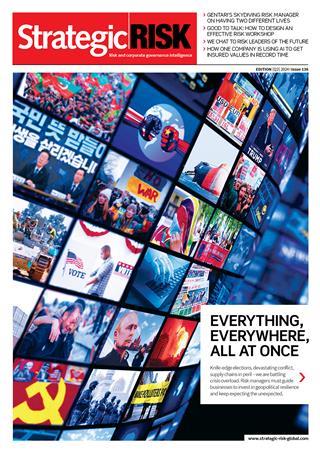Close menu
- Home
- Risk Type
- Risk Management
- Sector Risks
- Latest Edition
- SR.500 Exchange
SR Q2 2024: The great balancing act
2024-06-03T12:21:00

Parenthood and risk management have a lot in common – both demand a superhuman ability to multitask, stay one step ahead, and keep a cool head. Every day is another challenge… but you wouldn’t change it for the world, right?
For continued access to free content, you need to register. (If you’re already registered, please sign in here.)
REGISTER NOW FOR FREE
We’re glad you’ve chosen StrategicRISK as your essential source for risk management insight and hope you’ve been enjoying our content.
Gain access to our full archive of flagship quarterly digital issues, packed with strategic insights, market commentary, and opinion from leading risk management professionals. Registering is quick, easy, free, and will also have the additional benefits:
- Uncover Critical Insights: Dive deep with exclusive annual reports, fuelled by expert analysis on topics like climate change and industry trends.
- Stay Ahead with Expert Analysis: Award-winning coverage and analysis, delivered directly to your inbox through our newsletters.
- Curate Your Knowledge: Build a personalised library of essential articles and reports for quick reference.
- Access Premium Content: Unlock our full archive of in-depth articles, case studies, and expert opinions.
We also offer a dedicated print subscription.
LEARN MORE
- Sign In
- Forgotten Password
- Contributors
- Feedback
- Media Pack
- © StrategicRISK 2026
Part of the Insurance and Risk group of
Newsquest Specialist Media
Newsquest Specialist Media
Published by Newsquest Media Group Limited,
registered in England & Wales with number 01676637
at The Echo Building, 18 Albert Road, Bournemouth,
England, BH1 1BZ - a Gannett company
registered in England & Wales with number 01676637
at The Echo Building, 18 Albert Road, Bournemouth,
England, BH1 1BZ - a Gannett company
Site powered by Webvision Cloud







